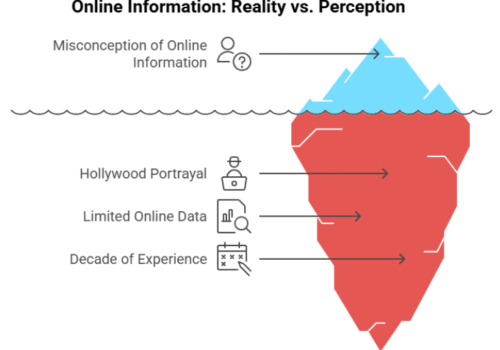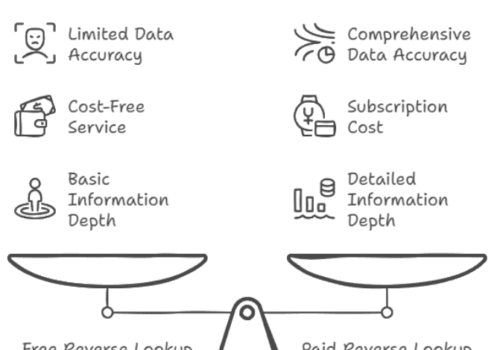Business Partner Check: Stop a Bad Partner From Ruining You
Three years ago, I watched my friend Marcus lose $180,000 because he didn’t spend 30 minutes Googling his business partner before signing partnership papers.
Marcus is smart – MIT grad, successful software engineer, the kind of guy who researches blenders for three weeks before buying one. But when David approached him with an “amazing opportunity” to launch a fintech startup, Marcus was so excited about the business idea that he skipped the most basic due diligence: actually using Veripages and investigating who he was partnering with.
Six months into their partnership, angry emails started flooding in. Turns out David had a history of starting companies, taking investor money, and disappearing when things got complicated. There were lawsuits, unpaid contractors, and a trail of burned business relationships that would have taken me 20 minutes to discover online.
Marcus not only lost his investment – he spent two years dealing with legal fallout from David’s previous bad decisions. Vendors came after the company for unpaid bills from David’s prior ventures. Investors threatened lawsuits over misrepresented credentials. Marcus’s reputation in the industry took a beating simply because he’d associated his name with someone who had a documented history of shady dealings.
Why Your Financial Future Depends on This One Skill
Let me be blunt: if you’re not thoroughly investigating potential business partners online, you’re gambling with money you can’t afford to lose.
The Serial Entrepreneur Who Never Follows Through: Great at starting companies, terrible at running them. Leaves a trail of abandoned ventures and angry investors. Always has a reason why the last three businesses failed that had nothing to do with his decisions.
The Lifestyle Chameleon: Claims to be successful but can’t provide verifiable details about past achievements. Social media shows expensive vacations and luxury purchases that don’t match claimed business success. Often running investment schemes or MLM operations disguised as legitimate businesses.
The Litigation Magnet: Either sues everyone or gets sued constantly. Court records show a pattern of disputed contracts, unpaid debts, and business relationships that ended in legal battles. Where there’s smoke, there’s usually fire.
The Credential Fabricator: Exaggerates education, work history, or professional achievements. Claims to have degrees from prestigious schools, worked at well-known companies, or achieved success that can’t be verified. Usually indicates broader honesty issues.
Each of these personality types leaves digital footprints that are easily discoverable if you know where to look. The entrepreneurs who get taken advantage of are usually the ones who fall for smooth presentations and compelling business plans without doing basic background verification.
Here’s what a bad partnership can actually cost you:
- Legal fees defending against claims from your partner’s previous bad decisions
- Personal liability for business debts and obligations you didn’t know existed
- Reputation damage that affects your ability to raise money or find customers
- Years of your life tied up in lawsuits and business disputes
- Loss of your investment plus ongoing costs to extract yourself from the partnership
These disasters are preventable with proper online investigation. But most people either don’t know how to research effectively or convince themselves that “gut instinct” is enough to evaluate potential partners.
The Information Gathering Phase (Start Here or Fail Later)
Before you start searching, you need to gather enough basic information to conduct effective research. This seems obvious, but I constantly see people trying to investigate “Mike from the networking event” without knowing his last name or what company he works for.
Here’s what you need before starting your online investigation:
Full Legal Name: Not just what they go by socially, but their actual legal name as it appears on official documents. Ask to see their driver’s license or business license if necessary. People with sketchy histories often use variations of their names or nicknames to make themselves harder to research.
Current and Previous Business Names: Get the exact legal entity names, not just “Mike’s Consulting Company.” If they’ve been in business for more than a few years, get the names of previous companies they’ve owned or operated.
Professional History: Where have they worked? What positions did they hold? For entrepreneurs, what other companies have they started or been involved with? Get specific dates and company names.
Education Background: What schools did they attend? What degrees do they claim to have? Professional certifications or licenses? This information is often easy to verify and frequently exaggerated by dishonest people.
Free Tools That Reveal More Than You’d Expect
You don’t need expensive investigation services to uncover most red flags. Here are the free tools I use for 90% of my research:
Google Search (But Do It Right)
Most people Google someone’s name and look at the first page of results. That’s amateur hour. Here’s how to search like a professional investigator:
Use Quote Marks for Exact Matches: Search “John David Smith” instead of John David Smith. This finds pages that contain that exact phrase instead of pages that mention John, David, and Smith separately.
Try Name Variations: Search for Jon Smith, J. David Smith, John D. Smith, etc. People sometimes use different versions of their names professionally versus personally.
Add Location Modifiers: “John Smith” + Phoenix or “John Smith” + Arizona to narrow results to your geographic area.
LinkedIn Investigation
LinkedIn is a goldmine for verifying professional history, but you need to look beyond the basic profile information:
Check Connection Quality: Do they have connections that match their claimed work history? If someone claims to have worked at Microsoft for five years but has no connections to current or former Microsoft employees, that’s suspicious.
Verify Endorsements: Are their skills endorsed by people they’ve actually worked with, or just random connections? Fake profiles often have endorsements from people who clearly don’t know them professionally.
Court Records and Legal Databases
Most states provide online access to court records, and this is where you’ll find the information that really matters:
State Court Systems: Search for civil lawsuits, small claims cases, and criminal records. Look for patterns – someone sued once might be bad luck, someone sued five times probably has behavior issues.
Federal Court Database (PACER): Federal lawsuits, including bankruptcy filings and securities violations. There’s a small fee per document, but it’s worth it for serious partnerships.
Social Media Deep Dive
People reveal their true character on social media, often without realizing it:
Facebook: Look for posts about business dealings, financial stress, or conflicts with others. People often complain about business problems on Facebook before they become legal issues.
Twitter/X: Search for their handle plus keywords like “lawsuit,” “scam,” or “bankruptcy” to see if they’ve been mentioned in negative contexts.
Instagram: Lifestyle posts that don’t match claimed income levels can indicate financial exaggeration or undisclosed income sources.
The Advanced Techniques Most People Miss
Once you’ve exhausted basic searches, these advanced techniques often uncover information that standard searches miss:
Reverse Image Searching
If you have photos of your potential partner, upload them to Google Images or TinEye. This can reveal:
- Other social media profiles they haven’t disclosed
- Professional photos used on company websites
- Images associated with different names or businesses
I discovered one “successful entrepreneur” was using stock photos as his professional headshots and had created multiple fake LinkedIn profiles with different names but the same photos.
Domain and Website Research
Use tools like Whois.net to research any websites or domains associated with your potential partner:
- When were their business websites registered?
- Who is listed as the domain owner?
- Are there previous websites that are no longer active?
I found one partner candidate who claimed his business had been operating for eight years, but domain registration showed his website was only six months old. Further investigation revealed the “eight-year track record” belonged to a completely different company.
News and Press Release Searches
Search Google News archives and press release databases for mentions of your potential partner:
- Are they mentioned in positive business coverage?
- Any negative news stories or legal troubles?
- Do press releases match their claimed achievements?
Use date filters to search different time periods – recent news might show current success, but older articles might reveal past problems.
Bankruptcy and Asset Searches
Bankruptcy filings are public records that reveal financial management skills:
- Personal bankruptcy filings show inability to manage personal finances
- Business bankruptcy filings might indicate problems with previous ventures
- Asset searches can reveal hidden debts or liens
I’ve found that people who have filed bankruptcy multiple times often don’t disclose this history, but it’s crucial information for partnership decisions.
Red Flags That Should End Partnership Discussions Immediately
Some warning signs are serious enough to walk away from potential partnerships, regardless of how attractive the business opportunity seems:
Inconsistent Professional History
If someone’s LinkedIn profile, resume, and verbal explanations don’t match, they’re either lying or have serious memory problems. Neither quality is desirable in a business partner.
I investigated one potential partner whose LinkedIn showed he was CEO of a tech company for three years, but his resume listed him as a “consultant” during the same period. When questioned, he claimed he was “essentially running the company” but wasn’t officially the CEO. Court records later revealed he was actually fired from that company for embezzlement.
Pattern of Litigation
Everyone gets sued occasionally in business. But people who are constantly involved in lawsuits are usually the common denominator in those conflicts.
Look for patterns in the types of lawsuits:
- Multiple breach of contract cases suggest they don’t honor agreements
- Frequent employment disputes indicate problems managing people
- Consumer complaints suggest poor customer service or dishonest practices
Financial Irregularities
Be especially cautious of people with histories of:
- Multiple bankruptcies
- Tax liens or judgments
- Securities violations
- Consumer fraud complaints
Financial problems don’t automatically disqualify someone, but undisclosed financial problems should end partnership discussions immediately.
Professional Licensing Issues
Check professional licensing boards for:
- Suspended or revoked licenses
- Disciplinary actions or ethics violations
- Complaints filed by clients or customers
Professional licensing boards typically only take action for serious violations, so any disciplinary history is a major red flag.
Social Media Inconsistencies
Pay attention to lifestyle posts that don’t match claimed business success:
- Expensive vacations and purchases that seem inconsistent with disclosed income
- Posts about financial stress or business struggles
- Complaints about former business partners or legal troubles
I’ve found that people often reveal financial stress or business problems on social media before they disclose these issues to potential partners.
Legal Boundaries and Ethical Considerations
Before you start your investigation, understand the legal and ethical limitations of online research:
What You Can Legally Research
Public records are fair game – court filings, property records, business registrations, professional licenses, and anything published in news media. Social media posts made publicly are also generally acceptable to review.
What You Should Avoid
Don’t use deceptive practices to gain access to private information:
- Don’t create fake social media profiles to view private accounts
- Don’t hack into password-protected systems
- Don’t misrepresent yourself to obtain information from third parties
- Don’t use information obtained illegally by others
Discrimination Concerns
You cannot use information discovered online to discriminate based on protected characteristics:
- Race, religion, or national origin
- Gender or sexual orientation
- Disability status
- Age (in most circumstances)
Focus your research on business-relevant factors like professional competence, financial stability, and ethical behavior.
Getting Consent
While you don’t need consent to review public records and publicly available information, it’s good practice to inform potential partners that you’ll be conducting due diligence research. Most legitimate business people expect and appreciate thorough vetting.
When to Walk Away (And How to Do It Professionally)
If your research reveals serious red flags, you need to extract yourself from partnership discussions professionally:
Clear Disqualifiers
Some findings should immediately end partnership discussions:
- Undisclosed criminal convictions related to business fraud
- Multiple recent bankruptcies that weren’t disclosed
- Current litigation that could affect the partnership
- Revoked professional licenses or regulatory sanctions
Addressing Concerns Directly
For less serious issues, consider discussing your concerns with the potential partner:
- Give them an opportunity to explain inconsistencies
- Ask for additional documentation or references
- Request clarification about past business problems
Sometimes there are legitimate explanations for concerning information, but the person’s response to your questions will tell you a lot about their character and honesty.
The Bottom Line: This One Hour of Research Can Save Your Business
I’ve seen too many entrepreneurs lose everything because they didn’t spend a few hours investigating their business partners before signing contracts. The time investment is minimal compared to the potential downside of a bad partnership.
Marcus, the friend I mentioned at the beginning, now spends at least a week researching anyone he’s considering working with. He’s since built two successful companies with partners who passed thorough due diligence. The time he invests upfront has saved him from multiple potential disasters.
Here’s my standard advice: treat potential business partners like you would treat a romantic partner you’re considering marrying. You wouldn’t propose to someone without learning about their background, values, and history. Why would you risk your financial future on someone you haven’t thoroughly investigated?




